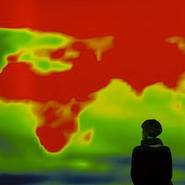Fondation Cartier pour l'art contemporain is furthering the conversation around the COP21 UN Conference on Climate Change with an exhibit at the Palais de Tokyo.
“Exit,” first staged in 2008, consists of a series of statistically-driven maps that study the migration of the world’s population, a subject that is inseparable from that of the altered climate patterns. With current events focused heavily on both cross-border movements and the changing atmosphere, this exhibit will likely strike a chord with visitors.
Finding patterns
Exit was conceptualized by French philosopher Paul Virilio, with design by architects and artists Diller Scofidio + Renfro and Laura Kurgan, statistician-artist Mark Hansen and Ben Rubin. These creatives worked with a team of scientists geographers to build the artwork for the 2008 exhibition “Native Land, Stop Eject,” which is now part of Fondation Cartier’s collection.
The piece consists of animated maps based on statistics of movement, linking the migrations of people to their causes, one of which is climate change. Exit has been updated for 2015 to coincide with the COP21 meeting.
Also making the exhibit timely is the migrant crisis happening across Europe.
Exit - Virilio, Diller Scofidio + Renfro, Hansen, Kurgan, Rubin, Pietrusko Smith - 2008 to 2015
"It’s almost as though the sky, and the clouds in it and the pollution of it, were making their entry into history,” Mr. Virillo is quoted saying of the exhibit. “Not the history of the seasons, summer, autumn, winter, but of population flows, of zones now uninhabitable for reasons that aren’t just to do with desertification, but with disappearance, with submersion of land. This is the future."
COP21 inspired a number of luxury companies to open up about their own sustainability.
While world leaders gathered in Paris to discuss climate change, French luxury conglomerate LVMH saw an opportunity to tout its sustainability practices while the world narrowed its lens on the topic.
Shared in a series of posts on its corporate social account on Facebook, LVMH offered insights into various programs and strategies implemented by the conglomerate and brands found within its stable, which includes Louis Vuitton, Bulgari and many others. Transparency has become a necessity as consumers are increasingly aware of and concerned about how and where the products they buy are made and the social and environmental impact they may have (see story).
{"ct":"snU8XapthB89TOfq+L+7poEogzirsacTdAsOSDRPZjzpwCq9hbnSWogewxZ3XpL3mw1pJ+PZuNDZBHbSc+IhJ8+p7NEdaiRKt4vwdqV9op8jeL8YpOzJMMThyy53wERz+4EGib68YRibPVVi5gAQp8jIC8vl5RBiqobNOox1XiLTeAgnPilGhI6MHasx4sUaoXhUS7XL9KT3nNqMR1209PpFx7+rRPH+EylE8DkIGdOtp+0y6uGMnbPeHNkD6UHpPi90dQ51xSkN\/aD7gXxjlfWTM2LwXhaJZwkYM\/2O9z93f+eCur5rJZ24LHa88p2cudr9cvZgEWEuJViyzVU\/C838tZyZBeJpJreddd+qWcgHBgEl3GMafbq4EZpT13L2t61H\/xN6zze4WdOHIBuw4INRtojQysts923gWb+QGwCsA9cBSXOtrUVocms4vr2WNtJGQ1JKzEKyuAyN47fqBI6+K694OOlWnsf4N4\/uHSSgwhAqoYIjfo0tiS097DxVFFQ+W+iuCfLiBAB+6I\/rM6sLBzUnFZJ673vA+K6oAIv\/A6S49lSMVbPpAgZGx0p301vMsHzRcGhRRq+Vr5g1SQbWydCHHMoLKCXhULPE5d6l12yRzWuDapPHnYFwRmWdZEhYJN\/H5j53mFjYhJ09JlJEpPRoKW6yI2EJIXh4ZLShhgYNxfOqlhhpvPAoJyU1pWltxoMXSv7HLRui8XK02dIy0bYmNLKWoD06Qs07BH\/+qt6CLBbmpa\/Uf9PNeC\/Zq4I4lislaVkN87UTz9+hcQouoOvL7Xh5JW9E4jl8CZuL6K\/Ykwl9PsVFuAy5Q5lYysFoiplj3NzYjd8i2QP3byqUWUF\/0Z5qf58x60reLIdT3n1OtoudeSeOET+XEL7RPAhiBGohzykyM433QaSfeOog7lcdajk\/xFH6MJgbhbKNKAkNInaTSIQr79YgHnSGxv55Ce1DiS4bXHCjCQeWyyu+t6z8nSbf3ufIQ5RejnW3ebwhsi9DOsRI4f+t0eW0uZGADEefrhlPHcqLfOwYYz+hSJSXiz\/HFZbA8EEErMDPmup4l+5DKErwSSh0PBF+bABUCKwRRTCiaqDrTqQ3sQ2OghZ+6v2x49GKhPFhFxJMY792gg3SVpzK+OhE5c5h6KCnX+IwrV+NVSKDY\/wwc1uxApHOAQfWTDqDWVvx0VTHELC00YYCkAgUcWJ4FBSQc+4qFNic\/R5k+NNkOE7PGn62QA96z8CKDbu0VaCO2Pyize9VK9YrGHHeqIQcY1lr63NbK4vCrjzeM5YrJWaETOAvx1P2EzkLxQIH7\/dIRiLaRqzt6IwD7T2b\/7g\/bD\/z3k0G+AcNHYnoF6wuL4hc9sWWEo4ZhLaRKhLeSybEgAHrDROF8foP\/3BGF7yDvYALFwzwg66SndRPV7BwxngS9dqhb+8hMdNjy5mR7LxbqNidrT5u9oSnO\/MkyW0XANlUxs3d4SBm3Q4ZenrsjZWQbmN5DRBve1y0g1QGFD8R0b076YcSO22CUIewLkkLfoUYUf3HzTx1uoPZnk9Uc9zrnqO7I93Ml20qmOYnOUM0ES0JsqzFSuZN9XexEvBOueHfRS\/kNQvSABRtxRFEH8Q0qTkQeGWzwh1ldgbBSS+dzBtwpAxmV+BwgRTQxQDCBJXnROVVm70I8V7da\/BSZQm1xcn3APefG4oAjABwaOnfA9N3FUjaU0bCQ9P7xsodzYdecag6gWk5+usJmnpBCiKn4CufZYWCIGWCARdxsXvLdVKAKUR2vjx8Bv\/loDJvkKn23uNAoQi6SnoMdq7glm9r9f2dWWwRgEgP+gYIcd+1MGSiiuz9o8HgORTIrzM+8\/gfXDuyl4FWZraw9wp6QMrvBfJSRZLdBGgqpIda4UsmnToqgBOGU2d74KFiICi2v72ngdNJrSmW7JerHQS3AT31YlSBNWZNhX\/PUADcbRJZkcWkT9s11937WBxQ5OC+o98c5R0mbG+dzERJ0xAbdnYmIL+C+E2fZOIK82ipAyBtVQ6TIK4qiOXVAJAZeKJfvEE8iSy3hjme6o0dJH+HX8d6iDstp5x3\/+\/q3ut5hfeZIGKdTKPD6SM6ZZ8AxAbW0ltFRyQhUA1fljGFcVdqAanKfBMMBeRh7NoMUCN6Z9K0DuZMStqcjYVRt\/Iv2CVCP5ThuMiGdHZul6wAPCGR8\/\/vcQSnywx0Ray3PB9xdiQ4mAVt977xsXFnqxJqWNQ0uVrQXxRVEjFzUXsgRLAgtWuDxP3x1+3epV+57S7QRSavwqXBbBLdoxdxhymuQiJ5j75UjYn8V8FGC9RevnnD58TCFa+06fnUalJpOzn+F0vEkb+7ByFE4K8b0OPhQ3gSOc+33pG0eiutMXauiupBckW1GSi5r\/4KIuKX8IZ3AYfeDqWCjFQQLc\/+kzlHy2tzCUTjqf2LxbZXC7O4TfRovTZJ9is2F7v1KLLkoYWBr2aqETFTcm6zQyzSZ7xcYOZgvH0XLv76wB4C0FaxRQVga7YfYlVQTA\/JLSKhd\/Of+rCjYX80bmBMsZN9MSB2683aDwpgOO9JscoBdBwPXgqxW0sApDi98Rtirwvx0Z1X7odZO+153wR+GAn4g6uIppquwEZ6vQLVS+faJC1kXl\/pMWk6STKtZLh8v7Wf2W57z32SDbbpdL7LxuQKQmAUxtVasAHqdawGanpaAYmnrikNEIcuqosXgJ0BZgCrLCtPFcONUnLx9\/d6XieCWmnqiWOU0ROtWgREX3RsePB2hVNfWGL6pbjReHogVRKHOEpyhQT8NjFdNhnu5zZpKD9t2TCnEi+uStD0R9msBUh6A4kPgT7AMCpc4nEMU5+8HhMIyZu0Km625+3BZ+3Ipcpr8MWSfiBWVX2x+BNrB\/x\/BcN4Da1lTL6kw64R0adEq7N1WKMYu95gJgp7z7Zpt9IznDyPa3wQ6JRk4H5BaDLWrnjiPULyz3FvPkS0JorculICchnN9Kt2BN+WsaRIzF9N4Q0K\/jxYb7Q6L05EAo1JHK2YZd68Ohg6TKYrWy6rNUJSYvdxh\/IsMfGzjlygoXy58V\/C3rccWOTxjFe\/luVywrwz6nIMzJytaDaOrYfGljuRe4S3Ra8V2UMXZtvxDnz57SoujzhMAh+\/VCzLcp1YbRVB053aI2SdS1U\/ikpDSBUSk0mDcLQ6K5zHC5joGSBgBnYonqew731NICeB\/+2uKQ2J6IsLH7+ALW89wFOWAGwjD6BVQHj6MHphHrn6CZTA64B0Ig5KKAX+Gr7SvfPLh5zx1T5UIszZSoFfS9XQkTSpbp38KxkZvAQ2B1AmHqGiB0hEMMNFYSjByxj5C\/YOAl36m4GX+TTTneOBS+pIj66Xgy9tpChAO19BESpIzBVfQLOsr8BOWdsXAqJKq1B15TGRP8H4gqNFDvBML3UwuNLY\/ukI77\/1caKLPBECvwIRz5IbBEwtYpeAqwh9GXfAAGWfGNtcpzyVJ\/UKw466CCg4kiJv9FeMfEuns5e\/XS9G70MGD67W9r+mKWLH+9WSI7ii\/2lsdxuT\/A5orKp8TgQLtoFKR0XCBDu64RKo4LOo0w9rHOmLX3SFCG2axGolUp51YR0sLa4VkxOpkphQgOHQKKvk6xoqJMqEA1L9if81Zh2cf8vXUB2f2mSuVmrqu4hDrZaKU7y7SNOvSJq9rZymnsogyVwXoUIYq\/VkjtKnAuhSN3s3XotUzi3D6cUIir\/pgN3gCXwWejPDAgBYtb3ntAeTDuEYKZrE4eoOp52wVAgf76mz6waxlZ3w1LGY+lh6Jp7moT6W8Gus40ZrOq6kgPryLPgPk+wjQ8BB8RRDtt3Ay\/eK","iv":"4b2d428c775131d7e0276ae923d7d40c","s":"0501236d810f4a07"}

 "Exit" presented by Fondation Cartier
"Exit" presented by Fondation Cartier